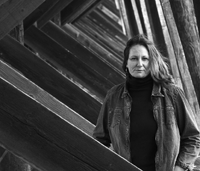
- Turtle Valley
- Knopf Canada (2007)
Gail Anderson-Dargatz often thinks of the forest fires that raged across British Columbia in 1998. She returned to her parents' home near Salmon Arm that year to help them evacuate, and was intrigued by the things people there chose to save, and the things they left behind.
That event served as the nugget of inspiration for her latest novel, Turtle Valley, and as part of her research for the book she interviewed other evacuees about the anguished decision over what to salvage from a lifetime's worth of photos, letters and family keepsakes.
Even in the course of everyday life (a move, or a good closet-purging) most people are faced with having to throw out some of the stuff accumulated over the years. In fact it can be great fun digging up old school reports and childhood toys. But do we lose something by letting go of these objects? Do we gain something by hanging on? Anderson-Dargatz discussed these, and other questions, with The Tyee, and what follows are excerpts from our conversation.
On why it's ironing boards people fight over
"[The things people treasure] rarely have any monetary value. There are always those small family arguments over objects and it's never about money. A person once told me about an ironing board that became a point of a family dispute. It was just an old ironing board. But, the mother had used it. Everyone associated the mother with this ironing board -- and they all wanted it. That happens so often.
"And at the time of a fire, for example, those objects gain a huge importance. The most amazingly inane things -- the burned out old pot, the cup that they got from the place where they worked, the stuff they would take to the thrift shop any other day -- become important because they survived the fire.
"I have a bulletin board immediately behind where I work and it's covered in my kids' drawings and family photos. If the house was on fire I'd get my kids the hell out of there and I'd grab that bulletin board. It's our history, right there.
On why clean people have it wrong
"I'm well aware, as a writer, of how much of my life I lose every day. I find year by year I have more trouble remembering things that happened even a couple of years ago. Our lives do fade away behind us as we live moment to moment.
"Photos, of course, are a huge repository for our memories. But objects also play that role and that's why our homes are full of them. Why do we keep them? Because they invoke memory.
"Going through a move I threw out all this stuff and then later regretted it because I don't have those things that trigger vast parts of my life. That's why we so often keep love letters from a former lover even though that relationship is long gone and maybe contains a lot of hurt. It's still a part of who we are and we don't want to give up that part of our lives."
On what e-mail misses
"I think we'll undoubtedly have fewer records, period, and fewer personal records. I love e-mail and use it constantly, but I don't print off my e-mails and I don't think most people do. They will just disappear into the ether and that will be the case for so many things. If we don't back up our digital photography -- if we don't transfer it to the next technology -- it will disappear. But something else will disappear as well; there is a loss of the personal.
"I can tell a great deal about my grandmother by her handwriting in her scrapbooks. I think people can tell much less about me from an e-mail. And that's a sad thing. We're losing personality and I think our childrens' children will probably know us less because of it."
On the fiction in real life
"If you look back on a childhood memory, you'll witness it as an observer. But if any two siblings sit down and talk about some family even they will get two different stories. I don't think there is any one family history, I think each of us remember everything very differently and experience things very differently. And our experience informs every memory. We reconstruct every time we recall.
"So what is our life then? Is it a fiction? Yeah, it is. And I think we all realize that on some level."






